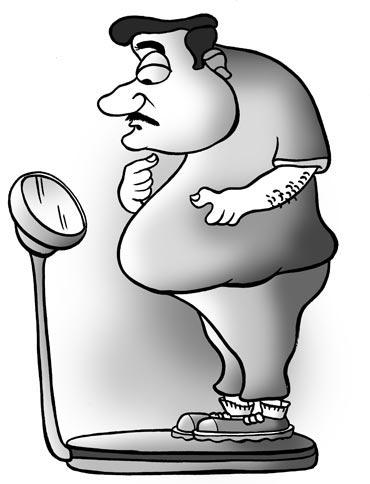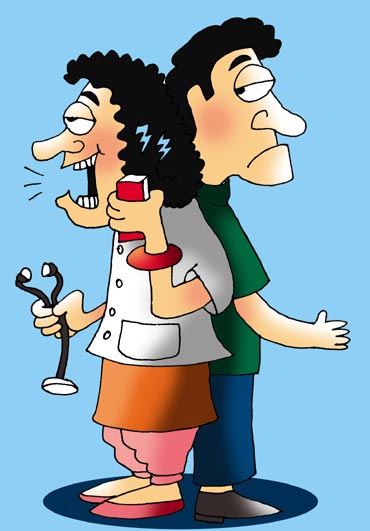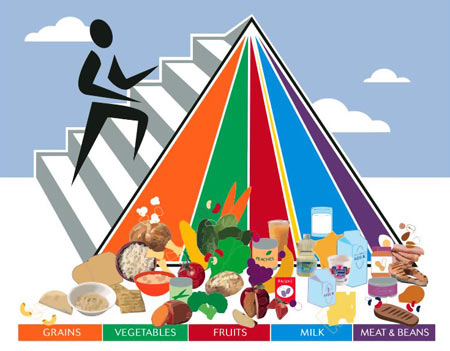 | « Back to article | Print this article |
Top 7: Reasons why Young India is getting OBESE
Swati Bhardwaj, of the Center of Nutrition and Metabolic Research (C-NET) and Prof Anoop Misra, Chairman, Fortis-C-DOC Centre of Excellence for Diabetes, Metabolic Diseases and Endocrinology spell out just why the collective waistlines of young India is widening more than ever and just what YOU can do about it.
Obesity among children and adolescents is emerging as a serious health burden and is acquiring epidemic proportions in developing countries such as India. It has been reported that childhood obesity tracks into adulthood and is associated with an increased risk of mortality, independent of weight loss later in life.
Childhood obesity is associated with a number of health problems such as hypertension, Type 2 Diabetes Mellitus, hypercholesterolemia and impaired glucose tolerance that were once confined to adults are now being diagnosed to children.
Likelihood of obese adolescent girls to suffer from Polycystic Ovarian Syndrome, a syndrome of variable combinations of menstrual irregularity, acne with obesity and insulin resistance.
Childhood obesity is associated with significant other morbidities including gallstone, dyslipidemia, obstructive sleep apnea syndrome, early puberty or menarche, eating disorders, skin infections, orthopedic disorders, asthma and other respiratory disorders.
According to our recent data, prevalence of overweight among 14-17 year old urban children increased from 24.2 per cent in 2006 to 25.2 per cent in 2009, while over same duration, obesity prevalence increased significantly from 9.8 per cent in 2006 to 11.7 per cent in 2009.
Top 7: Reasons why Young India is getting OBESE
Increasing trends overweight prevalence among 5 to 19 year old children/ adolescents is because of the following socio-cultural factors:
1. Unhealthy Nutrition
Comparatively low cost of energy -- dense foods, improved purchasing power, television advertisements targeting children and junk foods being sold in the school cafeterias are shifting the children's dietary habits from healthy foods to fried fatty and processed foods. Also because of the brand building effort that heavily targets this age-group; fast food becomes their first choice.
Top 7: Reasons why Young India is getting OBESE
2. Working status of parents
Parents these days are both working and have a hectic lifestyle. They are often overworked and it easy to let children order "fast foods" and hardly have any time to oversee balanced nutrition for children.
Illustration: Uttam Ghosh
Top 7: Reasons why Young India is getting OBESE
3. Lack of physical activity
Shift from outdoor play to indoor entertainment; television viewing, internet and computer games has attributed to increased childhood obesity. Children no longer want to ride a cycle and parents feel it is safer to ride a car than a cycle in a chaotic city.
Top 7: Reasons why Young India is getting OBESE
4. Academics
Increasing burden of academic competitiveness among students have led to decreased participation in sports and any other form of physical activity. This is particularly true for girls who are sedentary form school years. Many of the studies from India show that females have more obesity and the metabolic syndrome as compared to males.
Illustration: Uttam Ghosh
Top 7: Reasons why Young India is getting OBESE
5. Socio-economic status
Increased purchasing power in the form of daily allowance (pocket money) to purchase foods/snacks available in school cafeteria or nearby fast food joints could be a major reason for this.
Illustration: Uttam Ghosh
Top 7: Reasons why Young India is getting OBESE
6. Wrong parental approach
Parents in India and other developing countries usually have a general misconception that an obese child is a healthy child. And that if the child is fat, "baby fat" will go away with time. In an effort to keep child "healthy", he/she is fed in excess. Many of these children remain obese for the lifetime.Top 7: Reasons why Young India is getting OBESE
7. Technology
Most importantly with the advancement in technology, especially in the field of entertainment more time is spent on front of television, computers and video games at the expense of sports and physical activity, making it a sedentary lifestyle for the children.
How YOU can get rid of obesity
Prevention of obesity should be directed to encourage a health centered, rather than weight-centered approach that focuses on the individual as a whole. The emphasis should be on a healthy and active lifestyle and creating a nurturing environment that helps the youth recognise their own worth and respect cultural food ways. It is recognised that obesity, eating disorders, hazardous weight loss, nutrient deficiencies and size discrimination are all interrelated and need to be addressed in a comprehensive manner.
How YOU can prevent obesity
Lifestyle changes for preventing obesity should include:
Increasing physical activity
It is important that children/adolescents are encouraged to daily include at least 45-60 minutes of moderate intensity outdoor physical activity. Physical education may improve academic performance, self-confidence and mental health in school children.
How YOU can get rid of obesity
Balanced Diet
Following a balanced diet low in simple carbohydrate and fat, including a minimum of 5-6 servings of vegetables and fruit should be consumed to prevent obesity. Avoid eating high calorie foods like pizzas, burgers, aerated sugary drinks
How YOU can get rid of obesity
The following approaches have also shown to play an important role in management and prevention of obesity:
Nutrition Education
Parents should guide their children on making the right food choices and planning a balanced meal. Social events such as healthy eating clubs and interesting food preparations can be organised to encourage diet changes.
How YOU can get rid of obesity
Encouraging Healthy Eating
Attempts should be made to limit the availability of fried and fatty foods and carbonated beverages in school cafeteria and provide healthier options for children.
How YOU can get rid of obesity
Encouraging Parents Involvement
Parents should try to set examples by themselves eating healthy meal. They should share at least one meal with children.
How YOU can get rid of obesity
Community-based interventions should aim at providing a conducive environment for children to follow a healthy lifestyle, promote healthy food alternatives, and bring awareness and need about an increase in physical activity.
In India, we have initiated comprehensive programs aiming at childhood obesity, namely "CHETNA" (Children Health Education through Nutrition and Health Awareness program), and MARG (Medical Education for Children/ Adolescents for Realistic Prevention of Obesity and Diabetes and for Healthy Ageing). Children are given nutritional and physical activity education through lectures and leaflets, and with the help of debates, skits, and drama related to health topics. Parents and children also take part in making healthy recipes. The MARG program is the first large scale community intervention project in South Asia which focuses 100 per cent on primary prevention of not only obesity, but on non-communicable diseases in general.














